一般将来时详解+例句
一般将来时用法及例句
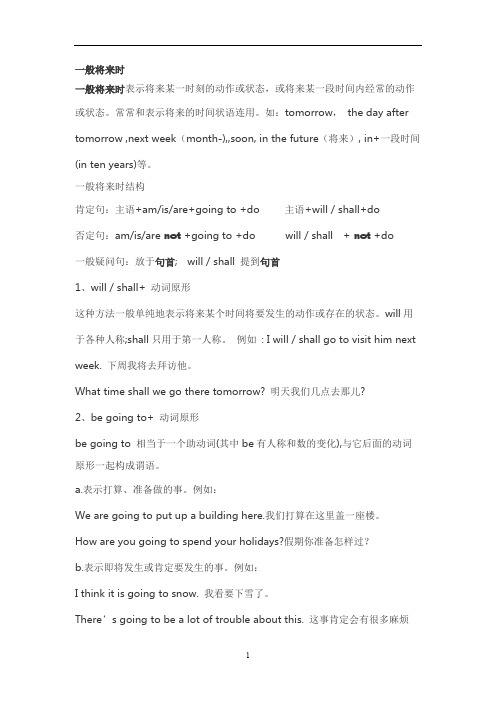
一般将来时一般将来时表示将来某一时刻的动作或状态,或将来某一段时间内经常的动作或状态。
常常和表示将来的时间状语连用。
如:tomorrow,the day after tomorrow ,next week(month-),,soon, in the future(将来), in+一段时间(in ten years)等。
一般将来时结构肯定句:主语+am/is/are+going to +do 主语+will / shall+do否定句:am/is/are not +going to +do will / shall + not +do一般疑问句:放于句首; will / shall 提到句首1、will / shall+ 动词原形这种方法一般单纯地表示将来某个时间将要发生的动作或存在的状态。
will用于各种人称;shall只用于第一人称。
例如: I will / shall go to visit him next week. 下周我将去拜访他。
What time shall we go there tomorrow? 明天我们几点去那儿?2、be going to+ 动词原形be going to 相当于一个助动词(其中be有人称和数的变化),与它后面的动词原形一起构成谓语。
a.表示打算、准备做的事。
例如:We are going to put up a building here.我们打算在这里盖一座楼。
How are you going to spend your holidays?假期你准备怎样过?b.表示即将发生或肯定要发生的事。
例如:I think it is going to snow. 我看要下雪了。
There’s going to be a lot of trouble about this. 这事肯定会有很多麻烦一、选择填空:( ) 1. There __________ a meeting tomorrow afternoon.A. will be going toB. will going to beC. is going to beD. will go to be( ) 2. Charlie ________ here next month.A. isn’t workingB. doesn’t workingC. isn’t going to workingD. won’t work( ) 3. He ________ very busy this week, he ________ free next week.A. will be; isB. is; isC. will be; will beD. is; will be( ) 4. There ________ a dolphin show in the zoo tomorrow evening.A. wasB. is going to haveC. will haveD. is going to be( ) 5. –________ you ________ free tomorrow?– No. I ________ free the day after tomorrow.A. Are; going to; willB. Are; going to be; willC. Are; going to; will beD. Are; going to be; will be ( ) 6. Mother ________ me a nice present on my next birthday.A. will givesB. will giveC. givesD. give( ) 7. – Shall I buy a cup of tea for you?–________. (不,不要。
一般将来时详解+例句

【答案】C
【解析】
试题分析:根据时间状语within 15 years,故用一般将来时。
考点:时态考查题
点评:通过时间状语,上下句意思和具体语境来确定时态。
4.--I have you asked John to come to the party this evening?
A.would increaseB.will increase
C.would have increasedD.will be increasing
【答案】B
【解析】
试题分析:考查时态。If条件句使用的是一般现在时代替一般将来时,所以主句也是一般将来时,和next year搭配使用。句意:如果我们的营销计划成功,我们明年销售将增加百分之三十。故B正确。
考点:考查动词时态。
10.- Will you be available at three o'clock tomorrow afternoon?
- No. I ______ a lecture then.
A.are attendingB.will have attendedC.will attendD.will be attending
【答案】A
【解析】
试题分析:考查时态。句意:杰姆斯,你知道明天是凯特的生日吗?真的吗?我今天下午下班后会给他买一个礼物。买礼物的动作将来某一时刻做的事情,用一般将来时。故选A。
考点:考查时态。
16.Mrs. Morris has left for London. She ________ a speech there next week.
六年级英语一般将来时讲解加练习
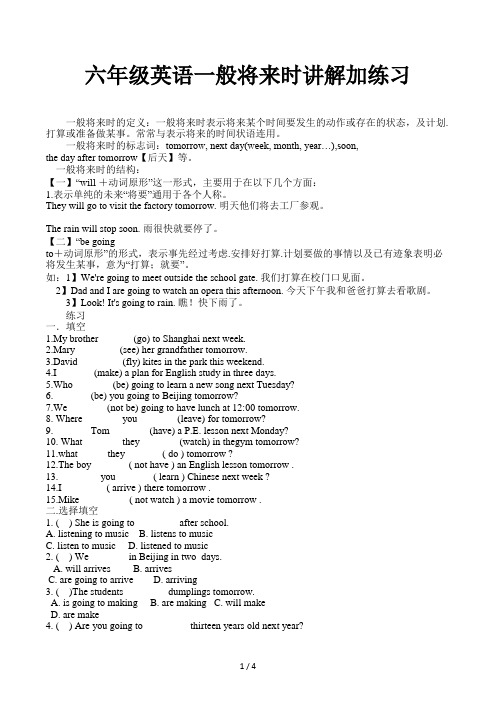
六年级英语一般将来时讲解加练习一般将来时的定义:一般将来时表示将来某个时间要发生的动作或存在的状态,及计划.打算或准备做某事。
常常与表示将来的时间状语连用。
一般将来时的标志词:tomorrow, next day(week, month, year…),soon,the day after tomorrow【后天】等。
一般将来时的结构:【一】“will +动词原形”这一形式,主要用于在以下几个方面:1.表示单纯的未来“将要”通用于各个人称。
They will go to visit the factory tomorrow. 明天他们将去工厂参观。
The rain will stop soon. 雨很快就要停了。
【二】“be goingto+动词原形”的形式,表示事先经过考虑.安排好打算.计划要做的事情以及已有迹象表明必将发生某事,意为“打算;就要”。
如:1】We're going to meet outside the school gate. 我们打算在校门口见面。
2】Dad and I are going to watch an opera this afternoon. 今天下午我和爸爸打算去看歌剧。
3】Look! It's going to rain. 瞧!快下雨了。
练习一.填空1.My brother ______ (go) to Shanghai next week.2.Mary ________ (see) her grandfather tomorrow.3.David ________ (fly) kites in the park this weekend.4.I_______ (make) a plan for English study in three days.5.Who _______ (be) going to learn a new song next Tuesday?6._______ (be) you going to Beijing tomorrow?7.We _______ (not be) going to have lunch at 12:00 tomorrow.8. Where _______ you _______ (leave) for tomorrow?9._______ Tom _______ (have) a P.E. lesson next Monday?10. What _______ they _______ (watch) in thegym tomorrow?11.what _____ they _______( do ) tomorrow ?12.The boy _______( not have ) an English lesson tomorrow .13.________ you _______( learn ) Chinese next week ?14.I ________ ( arrive ) there tomorrow .15.Mike _________ ( not watch ) a movie tomorrow .二.选择填空1. ( ) She is going to ________ after school.A. listening to musicB. listens to musicC. listen to musicD. listened to music2. ( ) We _______ in Beijing in two days.A. will arrivesB. arrivesC. are going to arriveD. arriving3. ( )The students ________ dumplings tomorrow.A. is going to makingB. are makingC. will makeD. are make4. ( ) Are you going to_________ thirteen years old next year?A. will beB. areC. beD. go5. ( ) ___will see a play in 5 days?A. WhenB. WhatC. WhoD. Whose6. ( ) Mary______ English next year.A. will learnB. will to learnC. are going to learn.D. learns7. ( ) He’ll _____ shopping this afternoon.A. goingB. goC. goesD. went8. ( ) Will you ____ at the bus stop at 10:30?A. meetingB. meetsC. meetD. met9. ( ) Lily and I _______ the guitar. next week.A. am going to playB. are going to playC. will playsD. play10. ( ) How ______ Jenny ___ home tomorrow?A. does......goB. is……goingC. will……goD. do……g o11. ( ) Who is going to _________ a song ?A. sings B singing C. to sing D. sing12. ( ) I _________in Beijing in three days.A. are going to arriveB. arriveC. will arriveD. arrives13. ( ) He _______some model planes tomorrow .A. going to makeB. is makingC. will make D makes14. ( ) Are you going to ___________a doctor next year ?A. will beB.. areC. beD. are going to15. ( ) She ________ you make supper this evening .A. helpsB. will helpC. is helpingD. is going help三.把下列句子变成一般疑问句,并给出肯定和否定回答。
高考一般将来时详解+例句
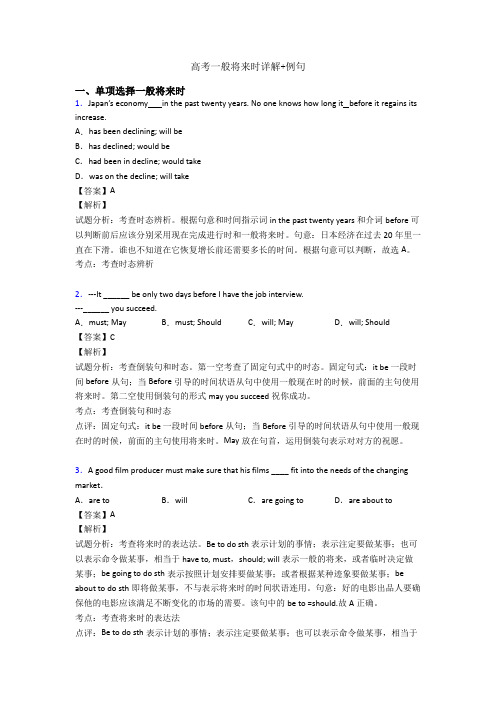
A.rained; rainsB.is raining; shall rain
C.has been raining; rainsD.has rained; will rain
考点:考查时态辨析
2.---It ______ be only two days before I have the job interview.
---______ you succeed.
A.must; MayB.must; ShouldC.will; MayD.will; Should
【答案】C
A.getsB.has been got
C.will getD.is getting
【答案】C
【解析】
试题分析:句意为“截止到医生检查完你的肺部,你才将会得到检查结果。By the time引导的是时间状语从句,从句中用现在完成时代替将来完成式,故主句用一般将来时。所以选C。
考点:考查时态
14.If their marketing plans succeed, they ________ their sales by 20 percent.
A.will haveB.am going to haveC.hadD.am having
【答案】A
【解析】
试题分析:句意:--早饭你准备吃什么?--我想我想吃些面包和牛奶。因为是将要吃..用一般将来时,排除C,ABD都可以表示一般将来时,will是临时决定,be going to do是计划,打算,be doing是即将,马上做…,所以选A。
11.If our marketing plan succeeds, we _______ the sales by thirty percent next year.
一般将来时用法及例句

B. will going to be
C. is going to be
D. will go to be
( ) 2. Charlie
here next month.
A. isn’t working
B. doesn’t working
C. isn’t going to working
D. won’t work
B. will have
C. had
D. would have
( ) 11. He
her a beautiful hat on her next birthday.
A. gives
B. gave
C. will giving
D. is going to giving
( ) 12. He
to us as soon as he gets there.
A. writes
B. has written
C. will write
D. wrote
( ) 13. He
in three days.
A. coming back
B. came back
C. will come back 二、动词填空:
D. is going to coming back
2
1. I
A. not care B. be happy C. feel worried D. be unhappy
( )14. When you make s mistake, you should
A. keep quiet B. get aense of humor
( )15. The story tells us :“
三、句型转换: 1. People in the north often go skating in winter. (next winter)
一般将来时用法及例句

一般将来时用法及例句
一般将来时(Simple Future Tense)表示将要发生的动作或事件。
在英语中,通常用辅助动词“will”或“shall”加上动词原形来构成一般将来时。
用法:
●肯定句:主语+ will/shall + 动词原形
1.I will meet her at the airport tomorrow.(明天我会在机场见她。
)
2.She shall call you later.(她会稍后给你打电话。
)
●否定句:主语+ will/shall + not + 动词原形
1.They will not come to the party.(他们不会来参加派对。
)
2.He shall not forget your birthday.(他不会忘记你的生日。
)
●疑问句:Will/Shall + 主语+ 动词原形+ 其他?
1.Will you help me with my homework?(你会帮我做作业吗?)
2.Shall we go to the cinema tonight?(我们今晚去电影院好吗?)
一般将来时用于预测、打算、意愿、承诺等将来的事件或行为。
大家可以多多练习。
【英语】一般将来时详解+例句

【答案】A
【解析】
试题分析:考查动词时态。句意:给他提姆买个手机怎么样?毕竟他不再是个孩子了。我认为是必要的,因为我们有时会想确认他是否会回来吃饭。根据句意这是一个宾语从句,确认他是否将回来吃饭,是一般将来时,A. will come一般将来时B. comes一般现在时C. has come现在完成时D. would come过去将来时,所以A正确。
A.has been declining; will be
B.has declined; would be
C.had been in decline; would take
D.was on the decline; will take
【答案】A
【解析】
试题分析:考查时态辨析。根据句意和时间指示词in the past twenty years和介词before可以判断前后应该分别采用现在完成进行时和一般将来时。句意:日本经济在过去20年里一直在下滑。谁也不知道在它恢复增长前还需要多长的时间。根据句意可以判断,故选A。
3.—Did you tell your parents about the result?
—Oh, no, I forgot. Ithem now.
A.will be callingB.will callC.am going to tellD.am to call
【答案】B
【解析】
句意:A选项是将来进行时,表示将来某个时间正在进行的动作;B、C、D均表示一般将来时。will+v原形表示临时决定的;而be going to do和be to do是表示按计划或安排要做的事。根据语境可知说话人是经别人提醒才临时想起要把结果告诉他父母,所以应该用will+v原形。句意:--你告诉你父母结果了吗?--没有,我忘了。我现在就去告诉他们。
英语一般将来时讲解

一般将来时一、一般将来时定义:一般将来时表示将来某一时刻,或将来某一段时间内的动作或状态。
二、一般将来时两个招牌单词will/shall,shall用于第一人称单数,如:shall I…,I shallshall we 。
we shall will则通用三、基本结构will/shall + V原四、缩略形式will 常简略为'll,并与主语连写在一起,如:I'll,he'll,it'll,we'll,you'll,they'll。
例句:Will you be free tonight? 你今晚有空吗?We won’t(shan’t) be busy this evening. 我们今晚不忙。
He’ll go to London next weekWe’ll only stay for two weeks. 我们只待两星期。
We’ll go to the Great Wall if it is fine tomorrow.We shall have a delicious dinner tonight. 今晚我们将美餐一顿。
Shall we go to the park ,tonight ??Tomorrow will be Sunday. 明天就是星期天。
The rain will stop soon. 雨很快就要停了。
Shall we go there at five? 我们五点钟去那儿,好吗?Will you please open the door? 请你把门打开,好吗?五、用法基本用法:“助动词will或shall+动词原形”这一形式,表示将来发生的事情,用于征求对方的意见或表示客气的邀请。
在口语中will用于所有人称,书面语中第一人称常用shall。
如:I can see you're busy, so I won't stay long.我看得出你很忙,所以我不会呆太久。
一般将来时的构造和用法

一般将来时的构造和用法一般将来时是英语中表示将来发生的动作或事件的时态。
它用来描述将来某一时间或情况下预计会发生的事情。
一般将来时的构造和用法有以下几种。
1. 肯定句结构:主语 + will + 动词原形 + 其他2. 否定句结构:主语 + will + not + 动词原形 + 其他3. 一般疑问句结构:Will + 主语 + 动词原形 + 其他?4. 特殊疑问句结构:特殊疑问词 + will + 主语 + 动词原形 + 其他?下面将分别对这些句子结构进行详细解释和示例。
1. 肯定句结构:主语 + will + 动词原形 + 其他肯定句结构用于表达预测、打算、意愿和承诺等将来发生的动作或事件。
以下是一些例句:- I will go shopping tomorrow.(我明天会去购物。
)- They will visit their grandparents next week.(他们下周会去拜访他们的祖父母。
)- She will study abroad next year.(她明年会出国留学。
)2. 否定句结构:主语 + will + not + 动词原形 + 其他否定句结构表示将来某一时间或情况下不会发生的动作或事件。
以下是一些例句:- He will not attend the meeting tomorrow.(他明天不会参加会议。
)- We will not travel to Europe next summer.(我们下个夏天不会去欧洲旅行。
)- The party will not start until 8 p.m.(晚会直到晚上8点才开始。
)3. 一般疑问句结构:Will + 主语 + 动词原形 + 其他?一般疑问句结构用来询问预测、打算、意愿和承诺等将来发生的动作或事件是否会发生。
以下是一些例句:- Will you attend the conference tomorrow?(你明天会参加会议吗?)- Will they come to our party this weekend?(他们这个周末会来我们的派对吗?)- Will she finish her project on time?(她会按时完成她的项目吗?)4. 特殊疑问句结构:特殊疑问词 + will + 主语 + 动词原形 + 其他?特殊疑问句结构用来询问关于将来动作或事件的特定信息。
一般将来时举例20句

一般将来时举例20句今天咱们来一起学习一般将来时,我给大家举20个例子,这样大家就会很容易明白啦。
1. 我明天要去公园玩。
我能想象到,明天的太阳会暖暖的,公园里的花朵五颜六色的,我会在草地上跑来跑去,还会去湖边看小鱼。
2. 他下周打算买一个新的足球。
他肯定特别兴奋,新足球的颜色可能是蓝色的,上面有白色的花纹。
他将带着新足球到操场上去,和小伙伴们一起踢个痛快。
3. 妈妈明天会做我最爱吃的红烧肉。
那红烧肉啊,一块块油亮亮的,咬一口,香香软软的。
妈妈在厨房忙碌的时候,锅里会散发出诱人的香味。
4. 爸爸明天将开车带我们去海边。
到了海边,我会看到一望无际的蓝色大海,海浪会一波一波地涌过来,打在沙滩上。
我们会在沙滩上堆城堡。
5. 我的好朋友下个学期要转学了。
他走的时候,我想我会哭的。
我们之前一起在课间玩耍,一起分享小零食,以后就不能这样了。
不过我们说好了,将来还会再见面的。
6. 小明明天要参加绘画比赛。
他会带上他的彩色画笔,在画纸上画出美丽的风景。
也许他会画一座高高的山,山上有绿树,山脚下有清澈的小溪。
7. 奶奶明天将去菜市场买菜。
她会挑新鲜的蔬菜,像绿油油的青菜,红红的西红柿。
她回来的时候,手里会提着满满的菜篮子。
8. 我后天要早起看日出。
天还没亮的时候我就会起床,爬到山顶。
那时候,天空会慢慢变亮,太阳就像一个害羞的小姑娘,一点点地露出脸来。
9. 老师下节课会给我们讲一个有趣的故事。
老师的声音会很好听,故事里可能有勇敢的小英雄,还有神奇的魔法。
我们都会听得入迷的。
10. 姐姐明天要去图书馆借书。
她会在一排排书架间穿梭,寻找她喜欢的书。
她借回来的书会有好看的封面,里面的故事也会很精彩。
11. 弟弟明年就要上小学了。
他会背上新书包,穿上整齐的校服。
他会认识很多新朋友,在学校里学习写字、算术。
12. 爷爷明天将去钓鱼。
他会带上他的鱼竿和小凳子,坐在河边。
河里的鱼儿游来游去,爷爷耐心地等着,他肯定能钓到好多鱼。
13. 我今天晚上会做一个美梦。
一般将来时的句子带翻译(最新)
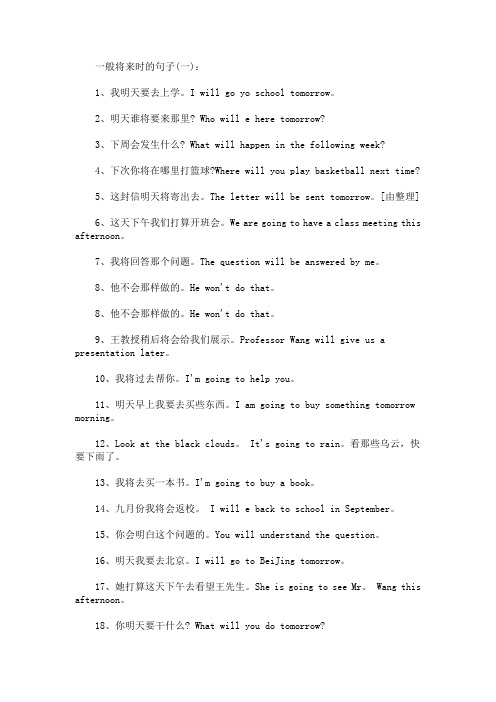
一般将来时的句子(一):1、我明天要去上学。
I will go yo school tomorrow。
2、明天谁将要来那里? Who will e here tomorrow?3、下周会发生什么? What will happen in the following week?4、下次你将在哪里打篮球?Where will you play basketball next time?5、这封信明天将寄出去。
The letter will be sent tomorrow。
[由整理]6、这天下午我们打算开班会。
We are going to have a class meeting this afternoon。
7、我将回答那个问题。
The question will be answered by me。
8、他不会那样做的。
He won't do that。
8、他不会那样做的。
He won't do that。
9、王教授稍后将会给我们展示。
Professor Wang will give us a presentation later。
10、我将过去帮你。
I'm going to help you。
11、明天早上我要去买些东西。
I am going to buy something tomorrow morning。
12、Look at the black clouds。
It's going to rain。
看那些乌云,快要下雨了。
13、我将去买一本书。
I'm going to buy a book。
14、九月份我将会返校。
I will e back to school in September。
15、你会明白这个问题的。
You will understand the question。
16、明天我要去北京。
I will go to BeiJing tomorrow。
一般将来时详解+例句

6.Only by practising a few hours every day ________ be able to play the piano well.
A.you wouldB.would youC.you willD.will you
【答案】D
【解析】
试题分析:考查倒装句和时态:句意:只有你每天练习几个小时,你才能把钢琴弹好。Only+副词/介词短语/状语从句+主句(主句用部分倒装),而且这句话的时间是every day,所以用一般现在时will,选D。
A.am going to takeB.takeC.have takenD.would take
【答案】A
【解析】
试题分析:考查时态。根据句中的时间状语this weekend,可以判断用将来时。英语中经常用现在进行时代替将来时。句意:——这个周末你有什么特别的计划?——是的,我打算带我女儿去迪斯尼。故A正确。
考点:考查倒装句和时态
点评:固定句式:it be一段时间before从句;当Before引导的时间状语从句中使用一般现在时的时候,前面的主句使用将来时。May放在句首,运用倒装句表示对对方的祝愿。
3.A good film producer must make sure that his films ____ fit into the needs of the changing market.
考点:考查倒装句和时态
7.— Tom! I forgot to bring my notebook this morning.
— Don’t worry! Iit for you.
A.will getB.getsC.am gettingD.am going to get
一般将来时详解+例句
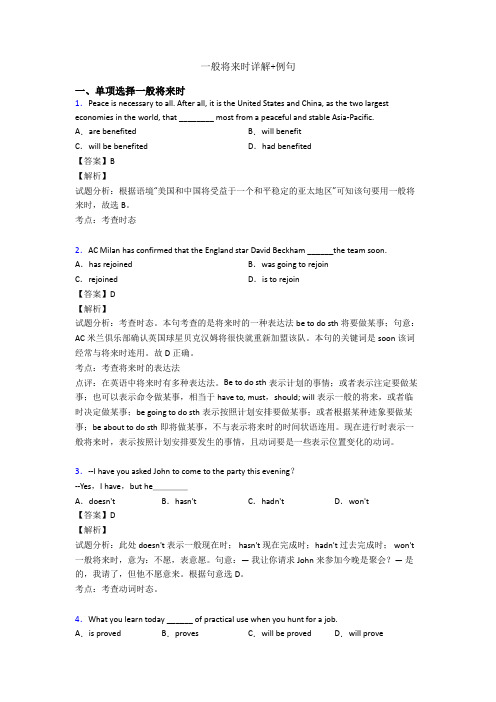
4.What you learn today ______ of practical use when you hunt for a job.
A.is provedB.provesC.will be provedD.will prove
【答案】D
【解析】
试题分析:考察时态和系动词。系动词prove证明,没有被动语态。排除AC项。句义:你今天所学得内容再你寻找工作的时候将会证明是很实用的。根据句义是指在将来找工作的时候证明是有用的。故D正确。
- No. I ______ a lecture then.
A.are attendingB.will have attendedC.will attendD.will be attending
【答案】D
【解析】
试题分析:考查动词时态。题意:“明天下午3点你有空吗?”“没空。我要听一个报告。”答句说的是未来某个时间点正在进行的动作,所以要用将来进行时态。D项正确。
【点睛】
一般将来时
1.表示未来的动作或状态常用will / shall +动词(常与表示将来的时间状语边用如tomorrow、next week等)。’ll die without air or water.
3.表示趋向行为的动词如come, go, start, begin, leave等词常用进行时的形式表示将来时。
9.I’m sure your suggestion will ____the problem.
A.contribute to solvingB.be contributed to solving
C.contribute to solveD.be contributed to solving
一般将来时的定义、结构、例句、用法
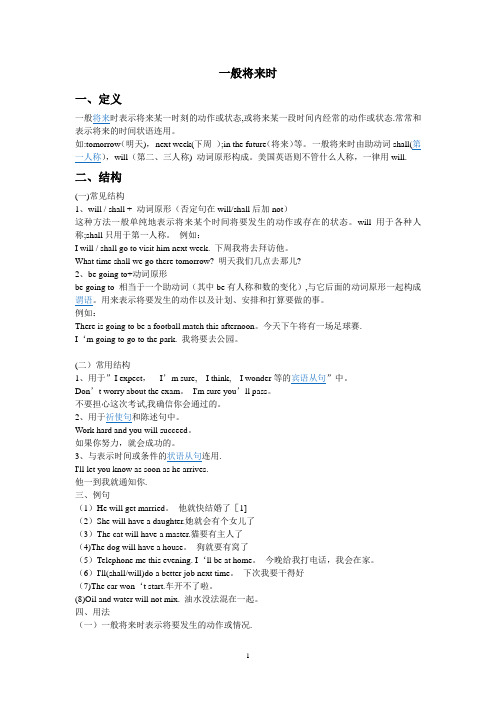
一般将来时一、定义一般将来时表示将来某一时刻的动作或状态,或将来某一段时间内经常的动作或状态.常常和表示将来的时间状语连用。
如:tomorrow(明天),next week(下周);in the future(将来)等。
一般将来时由助动词shall(第一人称),will(第二、三人称) 动词原形构成。
美国英语则不管什么人称,一律用will.二、结构(一)常见结构1、will / shall + 动词原形(否定句在will/shall后加not)这种方法一般单纯地表示将来某个时间将要发生的动作或存在的状态。
will用于各种人称;shall只用于第一人称。
例如:I will / shall go to visit him next week. 下周我将去拜访他。
What time shall we go there tomorrow? 明天我们几点去那儿?2、be going to+动词原形be going to 相当于一个助动词(其中be有人称和数的变化),与它后面的动词原形一起构成谓语。
用来表示将要发生的动作以及计划、安排和打算要做的事。
例如:There is going to be a football match this afternoon。
今天下午将有一场足球赛.I‘m going to go to the park. 我将要去公园。
(二)常用结构1、用于”I expect,I’m sure, I think, I wonder等的宾语从句”中。
Don’t worry about the exam。
I'm sure you’ll pass。
不要担心这次考试,我确信你会通过的。
2、用于祈使句和陈述句中。
Work hard and you will succeed。
如果你努力,就会成功的。
3、与表示时间或条件的状语从句连用.I'll let you know as soon as he arrives.他一到我就通知你.三、例句(1)He will get married。
将来时的各种形式及例句整理

将来时的各种形式及例句整理将来时是英语中用来表示将来动作或状态的一种时态,包含了多种形式。
在本文中,将介绍将来时的各种形式并提供相应的例句。
一、一般将来时一般将来时表示将来某个时间会发生的动作或状态。
一般将来时的构成方式如下:1. 主语 + will + 动词原形2. 主语 + be going to + 动词原形以下是一些例句:1. I will go to the movies tomorrow.(我明天会去看电影。
)2. They are going to have a party next week.(他们下周要开派对。
)3. She will learn to play the piano.(她将学会弹钢琴。
)二、将来进行时将来进行时表示将来某一时刻正在进行的动作。
将来进行时的构成方式如下:1. 主语 + will be + 动词ing以下是一些例句:1. They will be watching a movie at this time tomorrow.(明天此时他们将在看电影。
)2. She will be working on her project tomorrow morning.(明天早上她将在进行项目工作。
)三、将来完成时将来完成时表示将来某一时刻之前已经完成的动作。
将来完成时的构成方式如下:1. 主语 + will have + 过去分词以下是一些例句:1. By the time he arrives, I will have finished my homework.(等他到达时,我将已经完成作业。
)2. They will have left for Paris by the end of this month.(到本月末,他们将已经去巴黎了。
)四、将来完成进行时将来完成进行时表示将来某一时刻之前已经开始并且一直在进行的动作。
将来完成进行时的构成方式如下:1. 主语 + will have been + 动词ing以下是一些例句:1. By the time they arrive, we will have been waiting for three hours.(等他们到达时,我们将已经等待了三个小时。
一般将来时详解+例句
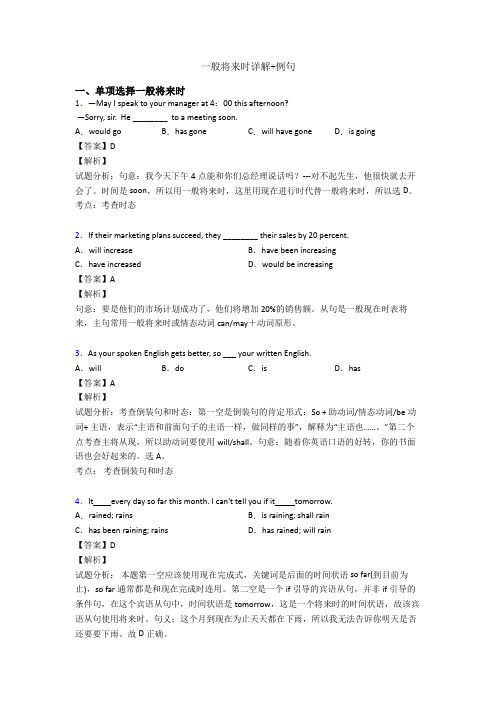
【解析】
B考察动词时态。句意:一种新款的鞋一旦投入市场,将会接到大量的订单,因为这种鞋的鞋跟高度可以在4到9厘米之间变化。If引导的状语从句,主句表示将来,从句用现在时代替将来时。光顾B正确。
14.If you _____ his wife’s income____ his own,the total of their income _____ 3000 yuan.
— Never mind. ________ it myself after school.
A.forget; I’d rather buyB.forgot; I’ll buy
C.forgot; I’m going to buyD.forget; I’d better buy
【答案】B
【解析】
【详解】
C.hadn’t showed upD.doesn’t show up
【答案】B
【解析】
试题分析:考查时态。根据语境及时间状语tomorrow afternoon可知用一般将来时。句意:——期望有多少人来参加你明天的宴会?——我送出了30份邀请,但三分之一将不会出现。故B正确。
考点:考查时态
19.— Sorry, I ________ to buy the book you need for you.
A.you wouldB.would youC.you willD.will you
【答案】D
【解析】
试题分析:考查倒装句和时态:句意:只有你每天练习几个小时,你才能把钢琴弹好。Only+副词/介词短语/状语从句+主句(主句用部分倒装),而且这句话的时间是every day,所以用一般现在时will,选D。
一般将来时例句(精选)

一般将来时例句(精选)“表示将来其中一时刻的动作或状态,或将来其中一段时间内经常的动作或状态。
接下来就由带来一般将来时例句,希望对你有所帮助!1、There will be a bad news for you。
将有一个坏消息给你。
2、There will be a delicious supper for us。
我们将有一顿美味的晚餐。
3、There will be a new dress for her。
她将有一条新裙子。
4、There will be a good news for you。
将有一个好消息给你。
5、There will be a show on the playground the day after tomorrow。
后天操场上将有一场表演。
6、There will be a concert tomorrow。
明天将有一场演唱会。
7、There will be a gift for me。
我将有一份礼物。
8、There will be a English class this afternoon。
今日午时有一节英语课。
9、There is going to have a English test next Monday。
下周一将有一次英语测验。
10、There will be a mobile phone tomorrow for me。
明天我将有一部手机。
11、There will be a fortable room for you tomorrow。
明天你将有一个舒适的房间。
12、There will be rain this evening。
今晚要下雨。
13、There will be television in our classroom。
我们教室将有一台电视机。
14、There will be a happy journey for her。
她将有一个愉快的旅程。
一般将来时详解+例句
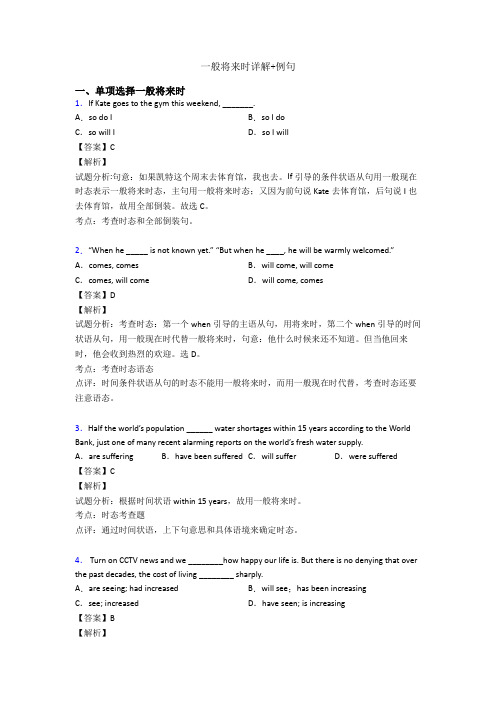
一般将来时详解+例句一、单项选择一般将来时1.If Kate goes to the gym this weekend, _______.A.so do I B.so I doC.so will I D.so I will【答案】C【解析】试题分析:句意:如果凯特这个周末去体育馆,我也去。
If引导的条件状语从句用一般现在时态表示一般将来时态,主句用一般将来时态;又因为前句说Kate去体育馆,后句说I也去体育馆,故用全部倒装。
故选C。
考点:考查时态和全部倒装句。
2.“When he _____ is not known yet.” “But when he ____, he will be warmly welcomed.”A.comes, comes B.will come, will comeC.comes, will come D.will come, comes【答案】D【解析】试题分析:考查时态:第一个when引导的主语从句,用将来时,第二个when引导的时间状语从句,用一般现在时代替一般将来时,句意:他什么时候来还不知道。
但当他回来时,他会收到热烈的欢迎。
选D。
考点:考查时态语态点评:时间条件状语从句的时态不能用一般将来时,而用一般现在时代替,考查时态还要注意语态。
3.Half the world’s population ______ water shortages within 15 years according to the World Bank, just one of many recent alarming reports on the world’s fresh water supply.A.are suffering B.have been suffered C.will suffer D.were suffered【答案】C【解析】试题分析:根据时间状语within 15 years,故用一般将来时。
一般将来时详解+例句

【答案】C
【解析】
C考查时态。答语意为“别担心,我帮你去取。等一下。”此处will用于一般将来时,表示“将要做临时决定的事情”。
11.It's really time I went home but I'm enjoying myself, so I ________ here a bit longer.
考点:时态。
9.—Help me out in the kitchen and I ________ you to a cup of coffee.
—Sounds good.
A.will treatB.treat
C.am treatingD.have treated
【答案】A
【解析】
考查时态。句意:——要是你在厨房里帮我忙的话,我将请你喝咖啡。——听起来不错。根据对话语境可知,应用一般将来时。
试题分析:考查动词时态。
考点:考查动词时态。
6.--Jack! I have left my key to the office at home.
-- Don’t worry. I _________ it for you. Wait a minute.
A.getB.am going to getC.will getD.am getting
考点:考查时态和全部倒装句。
19.Why don’t you put the meat in the fridge? It will_______fresh for several days.
- 1、下载文档前请自行甄别文档内容的完整性,平台不提供额外的编辑、内容补充、找答案等附加服务。
- 2、"仅部分预览"的文档,不可在线预览部分如存在完整性等问题,可反馈申请退款(可完整预览的文档不适用该条件!)。
- 3、如文档侵犯您的权益,请联系客服反馈,我们会尽快为您处理(人工客服工作时间:9:00-18:30)。
一般将来时
1.表示未来的动作或状态常用will / shall +动词(常与表示将来的时间状语边用如tomorrow、next week等)。
2.表示一种趋向或习惯动作。
例如:We’ll die without air or water.
3.表示趋向行为的动词如come, go, start, begin, leave等词常用进行时的形式表示将来时。
考点:考查时态
16.The students have been working hard on their lessons and their efforts _____ with success in the end.
A.rewardedB.were rewarded
C.will rewardD.will be rewarded
13.—May I speak to your manager at 4:00 this afternoon?
—Sorry, sir. He ________ to a meeting soon.
A.would goB.has goneC.will have goneD.is going
【答案】D
【解析】
—Oh, sorry. They ________.
试题分析:句意:我今天下午4点能和你们总经理说话吗?---对不起先生,他很快就去开会了。时间是soon,所以用一般将来时,这里用现在进行时代替一般将来时,所以选D。
考点:考查时态
14.If their marketing plans succeed, they ________ their sales by 20 percent.
考点:考查will用法
点评:情态动词will有多种不同的用法,will可以表示临时决定做某事;或者表示将来时。
3.—Did you tell your parents about the result?
—Oh, no, I forgot. Ithem now.
A.will be callingB.will callC.am going to tellD.am to call
试题分析:考查动词时态。
考点:考查动词时态。
4.Japan’s economy _______ in the past twenty years. No one knows how long it ______ before it regains its increase.
A.has been declining; will beB.has declined; would be
考点:考查时态
11.Come in and sit down and I ________ you what I've found recently.
A.showB.will show
C.showedD.was showing
【答案】B
【解析】
B考察动词时态。句义:进来坐下,我要给你看我最近发现的东西,祈使句后面接and/or连接陈述句中常常使用一般将来时。故使用will show。故B正确。
A.contribute to solvingB.be contributed to solving
C.contribute to solveD.be contributed to solving
【答案】A
【解析】
试题分析:句意:我确信你的建议会导致这个问题的解决。contribute to“贡献,有助于”,to是介词,后面做动名词,所以选A。
A.will haveB.am going to haveC.hadD.am having
【答案】A
【解析】
试题分析:句意:--早饭你准备吃什么?--我想我想吃些面包和牛奶。因为是将要吃..用一般将来时,排除C,ABD都可以表示一般将来时,will是临时决定,be going to do是计划,打算,be doing是即将,马上做…,所以选A。
一般将来时详解+例句
一、单项选择一般将来时
1.If Kate goes to the gym this weekend, _______.
A.so do IB.so I do
C.so will ID.so I will
【答案】C
【解析】
试题分析:句意:如果凯特这个周末去体育馆,我也去。If引导的条件状语从句用一般现在时态表示一般将来时态,主句用一般将来时态;又因为前句说Kate去体育馆,后句说I也去体育馆,故用全部倒装。故选C。
考点:考查时态
8.Only after one has become a parent _____ how great his parents are.
A.he will realizeB.will he realizeC.that he realizesD.he does realize
【答案】B
【答案】D
【解析】
【分析】
【详解】
本题考查时态和语态。解题步骤:1.确定时态:根据句尾的in the end可知,事情发生在将来,用将来时。2.确定语态:efforts和reward是被动关系,应该使用被动语态。句意:学生们一直在刻苦学习功课,他们的努力终将会得到回报。综上,用一般将来时的被动,故选D。
例如:If it is fine, we’ll go fishing.(正确)
If it is fine, we are going to go fishing.(错误)
(3)be to do sth.表按计划、安排即将发生的动作,还可表示吩咐、命令、禁止,可能性等。
例如:A meeting is to be held at 3:00 o’clock this afternoon.
15.By the time the doctor has made your lung checked, you_________ the result.
A.getsB.has been got
C.will getD.is getting
【答案】C
【解析】
试题分析:句意为“截止到医生检查完你的肺部,你才将会得到检查结果。By the time引导的是时间状语从句,从句中用现在完成时代替将来完成式,故主句用一般将来时。所以选C。
(4)be about to do sth.表示“即将/正要去做某事”,通常不与时间状语连用,但可与when引导的从句连用,构成常考句型:sb was about to do sth when sb did sth。
例如:Autumn harvest is about to start.
17.—Your windows are still open? It's so cold!
C.had been in decline; would takeD.was on the decline; will take
【答案】A
【解析】
试题分析:考查动词的时态和语态,。句义:在过去的二十年里日本经济已经下滑了。没有人知道再过多久才能恢复增长。
考点:动词的时态和语态,
5.Itevery day so far this month. I can't tell you if ittomorrow.
【解析】
试题分析:句意:只有一个为人父母了,他才知道父母多么的伟大。Only+副词/介词短语/状语从句,并放在句首的时候,后面的主句用部分倒装,助动词/be动词/情态动词放在主语前面,所以选B。
考点:考查倒装句
9.I’m sure your suggestion will ____the problem.
A.will increaseB.have been increasing
C.have increasedD.would be increasing
【答案】A
【解析】
句意:要是他们的市场计划成功了,他们将增加20%的销售额。从句是一般现在时表将来,主句常用一般将来时或情态动词can/may+动词原形。
考点:考查时态和全部倒装句。
2.However hard he tries,the recorder.
A.didn’t workB.won’t workC.isn’t workingD.hasn’t worked
【答案】B
【解析】
试题分析:考查will用法。句意:无论他多么努力尝试,这个录音机就不工作了。本题中的will表示的是一种倾向性,如The door won’t open.故B正确。
A.rained; rainsB.is raining; shall rain
C.has been raining; rainsD.has rained; will rain
【答案】D
【解析】
试题分析:本题第一空应该使用现在完成式,关键词是后面的时间状语so far(到目前为止),so far通常都是和现在完成时连用。第二空是一个if引导的宾语从句,并非if引导的条件句,在这个宾语从句中,时间状语是tomorrow,这是一个将来时的时间状语,故该宾语从句使用将来时。句义:这个月到现在为止天天都在下雨,所以我无法告诉你明天是否还要要下雨。故D正确。
考点:考察时态
6.— Lucy, how are you getting on with your composition?
— I have rewritten it so many times that I wonder if I ________ it.
A.finishB.finishedC.have finishedD.will finish
考点:考查动名词做宾语
10.— Tom! I forgot to bring my notebook this morning.
